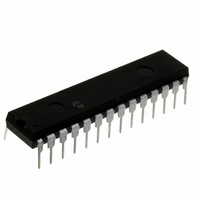DSPIC30F3010-20I/SP Microchip Technology, DSPIC30F3010-20I/SP Datasheet - Page 2

DSPIC30F3010-20I/SP
Manufacturer Part Number
DSPIC30F3010-20I/SP
Description
IC DSPIC MCU/DSP 24K 28DIP
Manufacturer
Microchip Technology
Series
dsPIC™ 30Fr
Datasheets
1.DSPIC30F3010-30ISO.pdf
(228 pages)
2.DSPIC30F3010-30ISO.pdf
(18 pages)
3.DSPIC30F3010-30ISO.pdf
(6 pages)
4.DSPIC30F3010-30ISO.pdf
(16 pages)
5.DSPIC30F3010-30ISO.pdf
(22 pages)
6.DSPIC30F3010-20ISP.pdf
(226 pages)
Specifications of DSPIC30F3010-20I/SP
Core Processor
dsPIC
Core Size
16-Bit
Speed
20 MIPS
Connectivity
I²C, SPI, UART/USART
Peripherals
Brown-out Detect/Reset, Motor Control PWM, QEI, POR, PWM, WDT
Number Of I /o
20
Program Memory Size
24KB (8K x 24)
Program Memory Type
FLASH
Eeprom Size
1K x 8
Ram Size
1K x 8
Voltage - Supply (vcc/vdd)
2.5 V ~ 5.5 V
Data Converters
A/D 6x10b
Oscillator Type
Internal
Operating Temperature
-40°C ~ 85°C
Package / Case
28-DIP (0.300", 7.62mm)
Core Frequency
40MHz
Core Supply Voltage
5.5V
Embedded Interface Type
I2C, SPI, UART
No. Of I/o's
20
Flash Memory Size
24KB
Supply Voltage Range
2.5V To 5.5V
Lead Free Status / RoHS Status
Lead free / RoHS Compliant
Other names
DSPIC30F301020ISP
Available stocks
Company
Part Number
Manufacturer
Quantity
Price
Part Number:
DSPIC30F3010-20I/SP
Manufacturer:
MICROCHIP/微芯
Quantity:
20 000
dsPIC30F3010/3011
10. Output Compare Module
11. Quadrature Encoder Interface (QEI) Module
12. INT0, ADC and Sleep Mode
13. 8x PLL Mode
14. 10-bit ADC: Sampling Rate
15. Quadrature Encoder Interface (QEI) Module
16. Sleep Mode
17. I
18. I/O Port – Port Pin Multiplexed with IC1
DS80216K-page 2
The output compare module will produce a glitch
on the output when an I/O pin is initially set high
and the module is configured to drive the pin low at
a specified time.
The Index Pulse Reset mode of the QEI does not
work properly when used along with count error
detection. When counting upwards, the POSCNT
register will increment one extra count after the
index pulse is received. The extra count will
generate a false count error interrupt.
ADC event triggers from the INT0 pin will not
wake-up the device from Sleep mode if the SMPI
bits are non-zero.
If 8x PLL mode is used, the input frequency range
is 5 MHz-10 MHz instead of 4 MHz-10 MHz.
The 10-bit Analog-to-Digital Converter (ADC) has
a maximum sampling rate of 750 ksps.
The QEI module does not generate an interrupt in
a particular overflow condition.
Execution of the Sleep instruction (PWRSAV #0)
may cause incorrect program operation after the
device wakes up from Sleep. The current
consumption during Sleep may also increase
beyond the specifications listed in the device data
sheet.
The I
operating as an I
The port I/O pin multiplexed with the Input Capture
1 (IC1) function cannot be used as a digital input
pin when the UART auto-baud feature is enabled.
2
C™ Module
2
C module loses incoming data bytes when
2
C slave.
19. ADC Module
20. Motor Control PWM – PWM Counter Register
21. I
22. Timer Module
23. PLL Lock Status Bit
24. PSV Operations
25. I
26. I
27. I
The following sections describe the errata and work
around to these errata, where they may apply.
The ADC module has an offset error (greater than
the specification mentioned in the device data
sheet), when using an internal reference (AV
AV
PTMR does not continue counting down after
halting code execution in Debug mode.
When the I
addressing using the same address bits (A10 and
A9) as other I
not work as expected.
Clock switching prevents the device from waking
up from Sleep.
The PLL LOCK Status bit (OSCCON<5>) can
occasionally get cleared and generate an
oscillator failure trap even when the PLL is still
locked and functioning correctly.
An address error trap occurs in certain addressing
modes when accessing the first four bytes of any
PSV page.
The 10-bit slave does not set the RBF flag or load
the I2CxRCV register on address match if the
Least Significant bits of the address are the same
as the 7-bit reserved addresses.
When the I
slave with an address of 0x102, the I2CxRCV
register content for the lower address byte is 0x01
rather than 0x02.
When the I
device generates a glitch on the SDA and SCL
pins, causing a false communication start in a
single-master configuration or a bus collision in a
multi-master configuration.
2
2
2
2
C Module: 10-bit Addressing Mode
C Module: 10-bit Addressing Mode
C Module: 10-bit Addressing Mode
C Module
SS
).
2
2
C module is enabled, the dsPIC
2
C module is configured as a 10-bit
2
C module is configured for 10-bit
C devices, the A10 and A9 bits may
© 2008 Microchip Technology Inc.
®
DSC
DD
,























